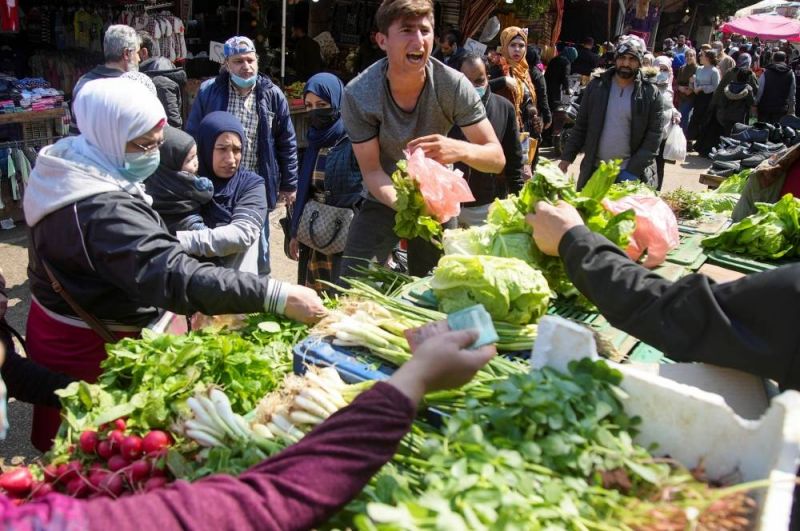
People shop for vegetables in a Beirut market. Food prices skyrocketed by 417 percent year over year in February. (Credit: Issam Abdallah/Reuters)
Want to get the Morning Brief by email? Click here to sign up.
A high-ranking American diplomat met with top Lebanese officials in an attempt to break the country’s cabinet formation deadlock. David Hale, the State Department’s No. 3 and a former ambassador to Lebanon, urged politicians to “show sufficient flexibility to form a government.” His visit aims to put pressure on the country’s leaders to reach an agreement over a cabinet that can implement reforms required by foreign donors to unlock financial support. Hale met with Parliament Speaker Nabih Berri, Prime Minister-designate Saad Hariri, PSP leader Walid Joumblatt, the caretaker foreign minister and the commander of the army yesterday. He is expected to meet with President Michel Aoun and other senior figures today.
Another fight over subsidized goods broke out at a supermarket. One person was slightly injured in the scuffle in a Kesrouan store over cooking oil. The incident came a day after a volunteer handing out free food was shot dead and two others were injured in clashes in Tripoli. Such disputes are becoming an increasingly common phenomenon across the country amid shortages of subsidized necessities and soaring food prices, which skyrocketed by 417 percent year over year in February.
Riad Salameh called on the government to urgently submit a plan to retarget subsidies. In a letter to caretaker Finance Minister Ghazi Wazni, the central bank governor urged the cabinet to quickly develop a clear plan to retarget subsidies since the current program is “no longer sustainable” and threatens Banque du Liban’s remaining foreign currency reserves. Salameh referred to the Beirut Bar Association’s threats to take the central bank to court if it dips into the mandatory reserves — a minimum of 15 percent of the total dollar deposits that commercial banks must keep at BDL — saying these reserves ultimately belong to depositors. BDL’s reserves stood at $15.8 billion at the start of this month, according to Wazni, who warned that Lebanon will run out of money to fund basic imports by the end of May.
Prosecutors have launched a probe into alleged BDL transfers to a company owned by the brother of the central bank governor. The local investigation appears to follow a similar one by Swiss authorities regarding some $330 million allegedly paid by the central bank to Forry Associates Ltd., a brokerage firm whose beneficial owner is Raja Salameh. In a separate lawsuit, filed by lawyers from an activist group, regarding alleged squandering of public funds and embezzlement, Beirut Judge Lara Abdel-Samad scheduled an interrogation of Riad Salameh for Oct. 13.
A judge ordered the seizure of assets owned by the former head of the Money Changers Syndicate. Mount Lebanon Investigative Judge Nicolas Mansour issued a decision ordering the seizure of assets belonging to Mahmoud Halawi, the owner of a major currency exchange shop, for allegedly violating money exchange laws by speculating against the lira, leading to market value manipulation of the national currency. Allegations of manipulation have grown as authorities look to assign blame for the lira’s dramatic depreciation since the financial crisis began.
Four protesters arrested during demonstrations in front of a police compound were acquitted by the Military Tribunal. The four had been arrested during a protest that led to clashes with security forces in front of the Sakanet al-Helou police compound in January 2020, Legal Agenda said. Multiple people were arrested last year during clashes with security forces outside the compound in Beirut’s Mar Elias neighborhood following a demonstration against the detention of dozens of people for their alleged involvement in protests on Hamra’s bank street.
The national COVID-19 committee has recommended a gradual reopening of schools and universities. Following a meeting with the education minister, the committee endorsed reopening the education sector at all levels, a process to be determined according to guidelines set by the Education Ministry. Caretaker Education Minister Tarek Majzoub has previously set conditions for a safe return to classrooms, including vaccinations for teachers and regular testing. More than 1 million children have missed out on education for over a year due to disruption caused by COVID-19 lockdowns and lack of access to online classes. However, the pandemic remains at a critical stage as the country reopens: Lebanon registered 2,460 new COVID-19 cases yesterday as 40 more people died, bringing the pandemic’s human toll to 6,778.